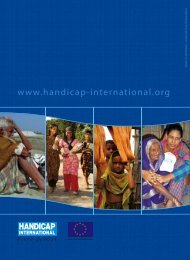Full page photo print - Harvard Law School Project on Disability
Full page photo print - Harvard Law School Project on Disability
Full page photo print - Harvard Law School Project on Disability
Create successful ePaper yourself
Turn your PDF publications into a flip-book with our unique Google optimized e-Paper software.
3. discuss:<br />
• What are the c<strong>on</strong>sequences when people with disabilities are excluded from accessing<br />
or imparting informati<strong>on</strong> in the life activities examined?<br />
• To the pers<strong>on</strong> with disability?<br />
• To society as a whole?<br />
• Which barriers have the greatest effect <strong>on</strong> people with disabilities?<br />
• What can be d<strong>on</strong>e to eliminate these most significant barriers to accessing or imparting<br />
informati<strong>on</strong>?<br />
whAT does humAn RighTs lAw sAy AbouT fReedom of<br />
eXPRessi<strong>on</strong> And oPini<strong>on</strong>?<br />
Article 19 of the universal declarati<strong>on</strong> of human Rights (UDHR) provides a c<strong>on</strong>cise<br />
descripti<strong>on</strong> of the right to freedom of expressi<strong>on</strong> and opini<strong>on</strong> that captures the essential<br />
elements, including the right to hold opini<strong>on</strong>s “without interference,” as well as the right to<br />
receive and impart informati<strong>on</strong> and ideas “through any media and regardless of fr<strong>on</strong>tiers .” 3<br />
Thus, there are no geographic restricti<strong>on</strong>s <strong>on</strong> the right, and the right can be enjoyed regardless<br />
of the methods or media used .<br />
The internati<strong>on</strong>al covenant <strong>on</strong> civil and Political Rights (ICCPR) 4 provides further<br />
elaborati<strong>on</strong> of the right, addressing in more detail when and how States may place restricti<strong>on</strong>s<br />
<strong>on</strong> its enjoyment . Article 19 of the ICCPR does not permit restricti<strong>on</strong>s <strong>on</strong> the freedom of people<br />
to hold opini<strong>on</strong>s, but does permit restricti<strong>on</strong>s <strong>on</strong> the right to freedom of expressi<strong>on</strong>, in order<br />
to respect the “rights or reputati<strong>on</strong>s of others,” nati<strong>on</strong>al security, public order, public health, or<br />
morals . As noted by the human Rights committee in its General Comment <strong>on</strong> the right, any<br />
such restricti<strong>on</strong>s must be provided by law and necessary to protect the interests permitted by<br />
the article . They “may not put in jeopardy the right itself” or be imposed arbitrarily .<br />
Other internati<strong>on</strong>al human rights c<strong>on</strong>venti<strong>on</strong>s do not provide the same level of detail about<br />
the freedom of expressi<strong>on</strong> and opini<strong>on</strong> as that given in the ICCPR . For example, Article 5 of<br />
the internati<strong>on</strong>al c<strong>on</strong>venti<strong>on</strong> <strong>on</strong> the eliminati<strong>on</strong> of All forms of Racial discriminati<strong>on</strong><br />
(ICERD) 5 merely notes that States must prohibit and eliminate racial discriminati<strong>on</strong> and<br />
guarantee equality in enjoyment of the “right to freedom of opini<strong>on</strong> and expressi<strong>on</strong> .” Article 13<br />
of the c<strong>on</strong>venti<strong>on</strong> <strong>on</strong> the Rights of the child (CRC) 6 largely repeats the ICCPR provisi<strong>on</strong>s,<br />
though Article 12 states that children should be able to express their views <strong>on</strong> matters<br />
c<strong>on</strong>cerning them and that those views should increasingly be taken into account as the child<br />
grows in maturity and competence .<br />
The n<strong>on</strong>-legally binding un standard Rules <strong>on</strong> the equalizati<strong>on</strong> of opportunities for<br />
Pers<strong>on</strong>s with disabilities (Standard Rules) 7 does not specifically address the right to freedom<br />
of expressi<strong>on</strong> and opini<strong>on</strong> . However, several of its rules address prec<strong>on</strong>diti<strong>on</strong>s to equality of<br />
participati<strong>on</strong> that are relevant to the enjoyment of this right:<br />
• Rule 1 addresses awareness-raising, which can positively impact the attitudinal barriers<br />
faced by people with disabilities when trying to exercise their right to freedom of<br />
expressi<strong>on</strong> and opini<strong>on</strong>;<br />
3 See http://www .unhchr .ch/udhr<br />
4 See http://www .ohchr .org/english/law/ccpr .htm<br />
5 See http://www .ohchr .org/english/law/cerd .htm<br />
6 See http://www .unhchr .ch/html/menu3/b/k2crc .htm<br />
7 See http://www .un .org/ecosocdev/geninfo/dpi1647e .htm<br />
66 humAn RighTs. yes! AcTi<strong>on</strong> And AdvocAcy <strong>on</strong> The RighTs of PeRs<strong>on</strong>s wiTh disAbiliTies




